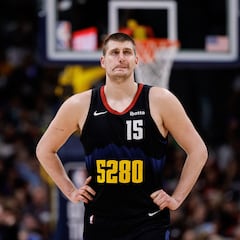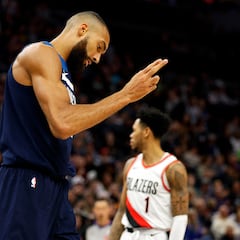NBA’s technical foul limit: After how many do players get a suspension?
Necessary, controversial, or silly are words used to describe the disciplinary call of a technical foul. But what exactly is it, and how does it work?

We’re taking a look at the NBA’s technical foul. A much-maligned part of the referee’s arsenal when it comes to controlling a game, the ‘tech’ can be both infuriating and fair in the dynamic world of the NBA.
What is the technical foul, and how does it work?
In simple form, a technical foul can be called on any player in the game or sitting on the bench for conduct that an official deems detrimental to the game. To be clear, the technical foul must be charged to an individual and can’t be called due to physical contact while the ball is in play. It’s worth noting that technical fouls exist at all levels of basketball. From high school to college and, of course, the NBA, it is part of the game, and in each of those cases, if a player accumulates two techs within a game, he is automatically ejected from it.
The NBA has rescinded this technical foul call on Jordan Poole (3 days later).
— Guru (@DrGuru_) March 10, 2023
Should the referee be fined for the call?
pic.twitter.com/H2htgOuefi
On the other hand, the NBA differs in one important aspect: the league utilizes a technical foul tally. That means players can accumulate up to 16 technical fouls in a season, after which they receive an automatic suspension for every two additional technical fouls they pick up. In other words, if you’ve got a player sitting on 16 technical fouls, they will be automatically suspended for one game when they hit 18, and understandably, the same will occur if/when they get to 20. The idea is obviously to curb ill-discipline.
The NBA uses fines to support technical foul
Aside from playing time, which can be cut for players who can’t behave, the league has also taken the stance of hitting them in their pockets. That’s to say that all NBA players are fined for every technical foul they receive. Adding further weight to this scenario is the fact that the fines themselves are tiered, meaning that the amount charged increases as they approach their 16th. For a look at what those tiers are, see below:
- Technical fouls 1-5: $2,000 fine each
- Technical fouls 6-10: $3,000 fine each
- Technical fouls 11-15: $4,000 fine each
- Technical foul 16: $5,000 fine + one-game suspension
- Each additional technical foul: $5,000 fine
- Each two additional technical fouls (18, 20, etc.): a $5,000 fine + one-game suspension
It’s also important to note that when a player is suspended, he is not paid for that specific game, i.e., aside from the sanction he has to pay, he doesn’t get paid himself. If there is any concession, it’s the fact that should a player receive his 16th technical during the final game of the regular season, it isn’t carried into the post season or the following season if his team failed to make the playoffs. On that note, we should mention that all technical foul tallies are reset when a player’s team makes the playoffs, however, automatic suspensions still exist in the post season. To that end, players are suspended after their seventh technical foul during the playoffs.
The NBA’s technical foul leaders
Related stories
As of March 10, the Mavs’ Luka Doncic picked up 15 technical fouls, followed by the Rockets’ Dillon Brooks with 14. Hawks’ Trae Young is third on the list with 13 techs; further down the list is Bucks’ Bobby Portis with 12, followed by Jordan Poole and Anthony Edwards from the Wizards and the Timberwolves with 11.
Rasheed Wallace technical foul fun facts:
— Timeless Sports (@timelesssports_) September 18, 2017
1) Had 41 in 77 games in '00-'01
2) Led the NBA in all but 3 years from '99-2010
3) Has 317 total pic.twitter.com/p7f2B7LBw1
As for who has the record for the most technical fouls in NBA history, that honor belongs to Rasheed Wallace, who picked up more than 300 techs across his 16-year career, in case you’re wondering, that’s 19 per season. To be fair to Wallace, the suspension rule was only implemented 11 years into his career. For a player to break his record, he’d have to serve a minimum of 14 suspensions, which is a lot.


Complete your personal details to comment